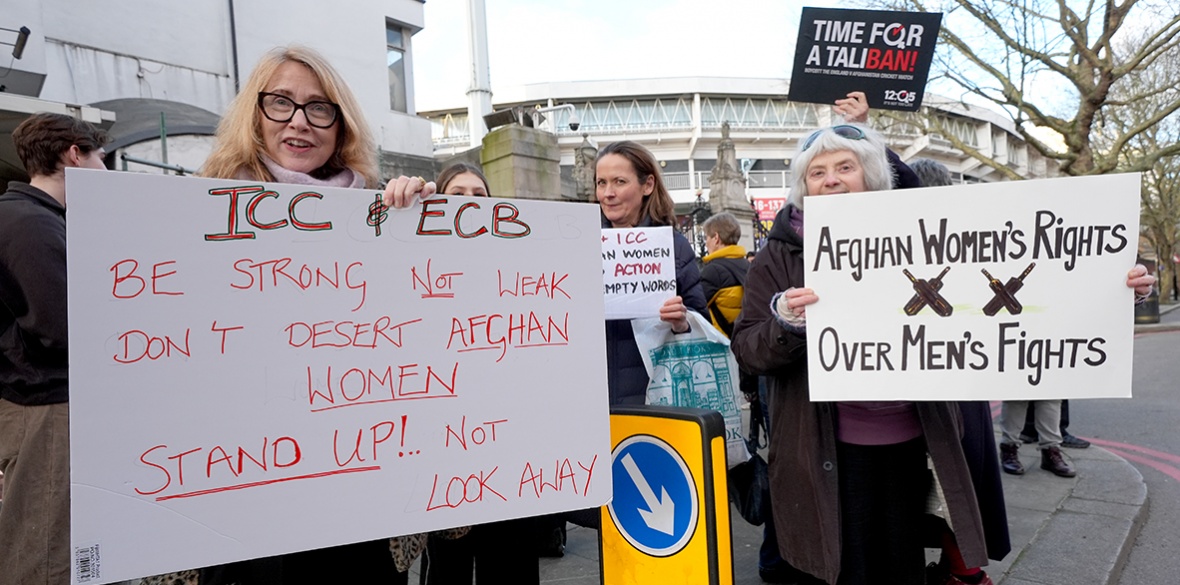This is the last article you can read this month
You can read more article this month
You can read more articles this month
Sorry your limit is up for this month
Reset on:
Please help support the Morning Star by subscribing here
IN A SMALL, windowless room inside a Taliban prison, a young woman sits on the cold concrete floor. Her hands, once raised in defiance at a protest, are now bruised and bound.
She does not know how long she has been here — days, maybe weeks. The guards do not say much; their actions speak for them. When they enter, she knows what is coming. She does not scream any more. She knows no-one is listening.
This is not an isolated incident. This is policy.
Since their takeover of Afghanistan in August 2021, the Taliban have institutionalised sexual violence as a tool of political suppression. Women who once led demonstrations, journalists who reported on gender apartheid and students who demanded their right to education have been systematically targeted, detained and subjected to sexual torture.
Reports from Amnesty International (2022) and Human Rights Watch (2023) confirm that detained women have been subjected to rape, sexual torture and forced marriages in Taliban-controlled detention centres.
The use of gender-based violence as a method of political suppression has also been highlighted by The Guardian (2024), which reported that over 300 cases of femicide have been documented since the Taliban’s takeover — though the actual number is likely much higher due to media restrictions and fear of retaliation.
Survivors who manage to escape do not speak — not because they do not want to, but because they cannot. The fear of being ostracised, abandoned or even killed by their own families silences them more effectively than the Taliban ever could.
In many cases, women who are released from Taliban custody face “honour killings” or permanent exile from their communities, reinforcing the Taliban’s control even beyond their prison walls
Despite the overwhelming evidence, the world remains indifferent. The UN issues statements, the International Criminal Court (ICC) debates legal definitions, and Western governments that once championed Afghan women’s rights now turn away, leaving thousands of women trapped in legal limbo in Pakistan and other countries.
Women who are arrested by the Taliban face a fate worse than imprisonment. Forced into marriages with Taliban members, under the pretext of “religious purification,” being told they have dishonoured Islam and must be cleansed through marriage, sexually assaulted and blackmailed, with multiple guards participating in gang rapes.
These assaults are often filmed and survivors are threatened with exposure to their families if they speak out. They are subjected to severe physical torture, including beatings with electric cables, genital electrocution and forced public humiliation, all extensively documented by the women’s rights organisation Azadi-e Zan.
The Taliban’s use of sexual violence is not incidental — it is a calculated method of erasing female resistance. By targeting activists and turning their bodies into battlefields, they send a clear message: women who fight back will be broken.
The Taliban do not only rely on physical force — they weaponise shame and honour culture to ensure that survivors remain silent.
In Afghanistan’s deeply patriarchal society, a woman who has been raped is often blamed rather than protected. Many women, upon release, are shunned or killed by their families to restore “honour.”
Some survivors are forced into suicide, unable to bear the rejection. Others disappear into self-imposed exile, knowing they can never reclaim their former lives.
By ensuring that the burden of shame falls on the victim rather than the perpetrator, the Taliban amplify the effectiveness of their violence. Women are not only silenced by force, but by the very communities that should protect them.
The UN’s current strategies lack enforcement mechanisms necessary to protect Afghan women’s rights effectively. Without imposing meaningful consequences, such as targeted sanctions or conditional engagement. The UN’s efforts may be perceived as insufficient to challenge the Taliban’s gender-apartheid policies.
Despite the overwhelming evidence of systematic sexual violence, the international legal framework remains insufficient in addressing the Taliban’s crimes.
While the ICC recognises sexual violence as a war crime and crime against humanity under Article 7 of the Rome Statute, a critical legal gap allows regimes like the Taliban to operate with impunity: the absence of gender apartheid as a recognised international crime.
The ICC recognises racial apartheid — a system where one racial group oppresses another through laws and policies. But gender apartheid, where women are systematically excluded from public life, education and employment, is not explicitly covered under international law.
This legal loophole means that even though the Taliban have imposed some of the most extreme restrictions on women’s rights in modern history, they cannot be prosecuted under the same framework used to hold racial apartheid regimes accountable.
Recognising gender apartheid as an international crime would establish legal grounds for prosecution. It would enable the ICC to prosecute regimes like the Taliban for systemic gender-based oppression and such recognition would compel nations around the world to take action against regimes practicing gender apartheid, leading to universal condemnation.
It would also affirm that no regime can systematically erase women’s rights without facing international legal consequences.
The international community must move beyond symbolic gestures and take tangible action by advocating for defining gender apartheid as an international crime, prioritise Afghan women’s asylum claims and ensuring that Afghan women activists are not deported back into the hands of their oppressors.
In addition, ending political engagement with the Taliban until women’s rights are restored, the UN and global powers must refuse to recognise or negotiate with the Taliban unless women are reinstated into public life.
Last but not least, the global feminist movement ought to focus on Afghan women’s struggle and push for international legal accountability.
Shukria Rahimi is a women’s rights activist.







